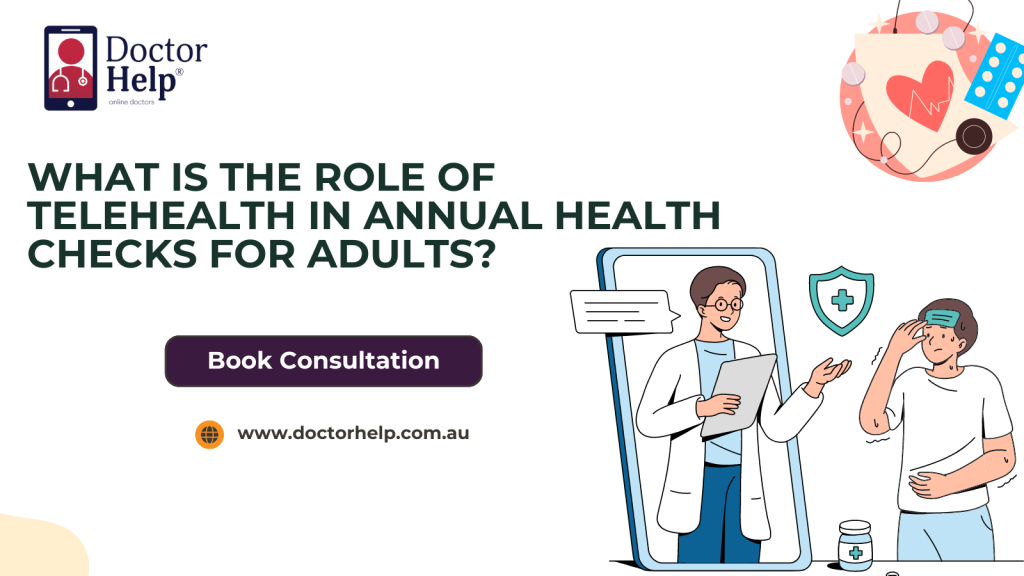Regular health checkups for adults are essential to maintain good health and early diagnosis of possible health concerns for adults. The role of telehealth is significant for maintaining the connection with the doctors after the checkups. This article provides an overview of the essential health checks recommended for adults across all age brackets, highlighting proactive health management’s role in maintaining optimal health.
Cardiovascular Health Examination
⦁ Monitoring Blood Pressure
Heart diseases and strokes are the result of elevated blood pressure. Routine checkups are recommended for adults, with a 2-yearly frequency for those adults who have normal levels and keep no significant risk factors. Indigenous people like Aboriginal and Torres Strait Islander individuals as well as those with a history of cardiovascular issues, diabetes, or a genetic predisposition to hypertension, may need more frequent monitoring.
⦁ Cholesterol and Lipid Profile
From the age of 35, or even earlier those who carry the risk for heart disease, and diabetes, may require regular screenings for cholesterol, more often. These examinations and screenings serve the purpose of saving individuals from further complications. Mostly general recommendation for re-screening every five years is given along with adjusting lifestyle habits or prescriptions as necessary based on individual health status.
Metabolic and Endocrine Health
⦁ Diabetes Screening
Diabetes risk factors increase the passing age, family history, and lifestyle routine. Normal screening of individuals without symptoms should begin at the age of 35, with the reassessment every three years if initial results are normal.
Patients with initial symptoms and predisposing factors might need to start earlier and undergo screenings more frequently. Here telehealth plays an important role in maintaining the connection with the doctors and the prescription refills for individuals who are diagnosed with chronic diseases.
⦁ Oral Care and Dental Health
Like many factors, oral care also contributes to the well-being of individuals as it provides insights into their overall health, from poor dental hygiene to many other systemic problems. Usually, the dentist recommends annual dental exams and cleaning for adults to ensure good oral health and early detection of potential problems.
Cancer Screenings
⦁ Skin Cancer Assessments
As it’s known that skin cancer in Australia is common and preventable, regular sef examinations are crucial. Ask for a specialist referral after talking to the GP via telehealth appointment if there is anything unusual for the professional skin checkup is essential. Every adult should be vigilant regarding changes in their skin and get professional advice for any concerning lesions.
⦁ Prostate And Breast Health
Starting from the 40’s women should consciously discuss mammogram examination with the health care providers. These could also be discussed with the telehealth healthcare providers. While men above 45-50 those at higher risk, should discuss prostate health screenings. Both screenings are pivotal for early detection and better outcomes.
Reproductive and Sexual Health
⦁ Cervical Cancer Screening
Females above 21 should undergo regular examinations for cervical cancer. Tests like Pap smears and HPV tests, according to age and health history guidelines.
⦁ Sexual Health Screenings
For all sexually active adults, regular screenings for STIs are crucial to sustaining reproductive health and preventing transmission
Psychological Well-being
⦁ Psychological Assessment
Mental health is very important for balancing healthy life. Adults need to undergo regular evaluation to identify problems including depression, anxiety, or stress at early stages. This also helps to reduce further complications and early help for those in need.
⦁ Age-Specific Screenings
⦁ At the age of 20s and 30s developing a health baseline and getting diagnosed early with the health issues is essential. This includes testicular or breast self-exams, STI testing, vision tests and dental checks.
⦁ In the 40s and 50s age group, the focus shifts to identification and precautions for chronic disease. The prevention and early detection, including comprehensive, heart health evaluations, diabetes vigilance, and colorectal cancer screening starting at age 45.
⦁ 60’s and above same diagnosis of diseases developed from age continues. So screenings like osteoporosis testing, eye and hearing exams, and maintaining cancer screenings rely on individual risk factors and health history.
Talk to a GP now for a quick consult and get medical advice.
Role of Telehealth in Annual Health Check-Ups: Summary
Convenience and Accessibility: Allow consultations from home, aiding those with mobility issues or living in remote areas.
Preventive Care Planning: Effective for discussing health history, lifestyle, and preventive measures.
Routine Evaluations: Manages ongoing conditions (e.g., hypertension, diabetes) and adjusts treatments based on patient-reported data.
Mental Health: Provides a private and comfortable setting for mental health consultations.
Follow-Up Visits: Reduces travel needs after initial in-person consultations or treatments.
Limitations:
Physical Examinations: Certain screenings and physical exams (e.g., blood tests, and mammograms) require in-person visits.
Diagnostic Limitations: Some conditions need physical examinations or diagnostic tests not possible remotely.
Technological Barriers: Not all patients have access to or are comfortable with telehealth technology.
Integrating Telehealth with In-Person Care:
- Initial Assessment: Use telehealth to discuss medical history and current health concerns.
- Physical Examination: Schedule in-person visits for necessary exams and screenings.
- Ongoing Management: Utilize telehealth for follow-ups, medication management, and chronic condition monitoring.
Conclusion
Telehealth plays a significant role in annual health check-ups by offering a convenient and accessible option for routine evaluations, preventive care, and follow-ups with the APHRA registered healthcare professionals. However, it should complement rather than replace in-person visits required for physical examinations and diagnostic tests. This hybrid approach ensures comprehensive health management and enhances overall well-being.








